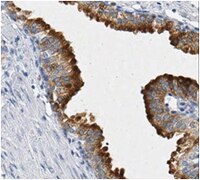MABN318 Sigma-AldrichAnti-Transmembrane Prostatic Acid Phosphatase Antibody/TMPAP, clone 3G10.1
This Anti-Transmembrane Prostatic Acid Phosphatase Antibody/TMPAP, clone 3G10.1 is validated for use in western blotting & IHC (Paraffin) for the detection of Transmembrane Prostatic Acid Phosphatase/TMPAP.
More>> This Anti-Transmembrane Prostatic Acid Phosphatase Antibody/TMPAP, clone 3G10.1 is validated for use in western blotting & IHC (Paraffin) for the detection of Transmembrane Prostatic Acid Phosphatase/TMPAP. Less<<Recommended Products
Overview
| Replacement Information |
|---|
Key Spec Table
| Species Reactivity | Key Applications | Host | Format | Antibody Type |
|---|---|---|---|---|
| H | WB, IH(P) | M | Purified | Monoclonal Antibody |
| References |
|---|
| Product Information | |
|---|---|
| Format | Purified |
| Presentation | Purified mouse monoclonal IgG1κ in buffer containing 0.1 M Tris-Glycine (pH 7.4), 150 mM NaCl with 0.05% sodium azide. |
| Quality Level | MQ100 |
| Physicochemical Information |
|---|
| Dimensions |
|---|
| Materials Information |
|---|
| Toxicological Information |
|---|
| Safety Information according to GHS |
|---|
| Safety Information |
|---|
| Storage and Shipping Information | |
|---|---|
| Storage Conditions | Stable for 1 year at 2-8°C from date of receipt. |
| Packaging Information | |
|---|---|
| Material Size | 100 µg |
| Transport Information |
|---|
| Supplemental Information |
|---|
| Specifications |
|---|
| Global Trade Item Number | |
|---|---|
| Catalogue Number | GTIN |
| MABN318 | 04053252947056 |
Documentation
Anti-Transmembrane Prostatic Acid Phosphatase Antibody/TMPAP, clone 3G10.1 SDS
| Title |
|---|








